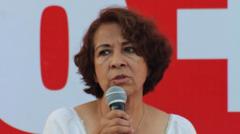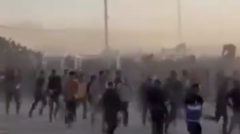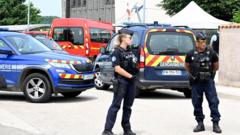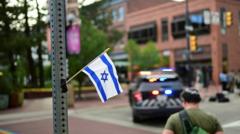The recent killing of 21-year-old journalism student Shatha al-Sabbagh during a security operation in Jenin has ignited outrage within the Palestinian community. As tension escalates between the Palestinian Authority and armed groups, many residents feel the brunt of violence and suffering. Al-Sabbagh's mother calls for justice, questioning the safety guaranteed by the PA amidst ongoing conflicts.
Tragedy in Jenin: The Death of a Young Journalist Highlights Internal Conflict in the West Bank

Tragedy in Jenin: The Death of a Young Journalist Highlights Internal Conflict in the West Bank
Shatha al-Sabbagh's death in Jenin exposes the turbulence between Palestinian Authority and armed factions amid intensified military operations.
Just before ringing in the New Year, 21-year-old Shatha al-Sabbagh was purchasing chocolate to celebrate with her family's children in Jenin, situated in the occupied West Bank. A passionate and committed journalism student, Shatha aimed to illuminate the plight of Palestinians through her work. Tragically, what began as a joyful outing turned into a nightmare as she was shot in the head, leaving her family shattered.
Her mother, Umm al-Motassem, vividly recalls the harrowing moment. "Shatha's eyes were wide open. It looked like she was staring at me while lying on her back with blood gushing from her head." Despite her cries for the shooting to halt, the violence persisted, claiming Shatha's life as she lay in a pool of her own blood.
Her family places the blame firmly on the Palestinian Authority's (PA) security forces, who dominate their neighborhood. They assert that outside influences could not have accessed the area due to the PA's presence. In contrast, the PA attributed the shooting to "outlaws," referring to militant members of the Jenin Battalion, which comprises fighters from groups like Hamas and Palestinian Islamic Jihad (PIJ).
This situation intensified when the PA initiated a broad security campaign targeting these armed groups, which they believe threaten their authority. For nearly a month, the operations have fueled tensions within the Jenin refugee camp, where the deadly consequences have drawn heavy criticism from locals who express fears of the PA as much as they do towards Israeli military incursions.
The crackdown has reportedly resulted in at least 14 deaths, including a child, according to the Palestinian health ministry. Mourners and activists openly grieve, including groups like Hamas, which condemned Shatha's killing as part of a broader oppressive policy against the Jenin camp.
As clashes continue, many residents feel their daily lives disrupted. The PA's operations have resulted in severe restrictions on movement, food scarcity, and power outages. Locals share their hardships, detailing how shops remain shuttered and streets are filled with debris amid ongoing hostilities.
Calls for accountability and justice resonate throughout the community, where fears of reprisals discourage individuals from speaking out against authority. Amid rising despair, the United Nations has called for an investigation into human rights violations by PA forces.
Brig Gen Anwar Rajab of the PA maintains the security campaign is essential for restoring order, asserting that armed factions must be dismantled to prevent further chaos in the region. However, this view is met with skepticism, as many perceive the PA's actions as punishing the entire camp rather than targeting those responsible for violence.
With increasing tension and an urgent call for unity among disparate Palestinian factions, the lingering question remains: will justice be served for Shatha al-Sabbagh, and how will the ongoing violence shape the future of the West Bank? As Umm al-Motassem reflects, "They can go after the 'outlaws' but why did my daughter have to die?"






















